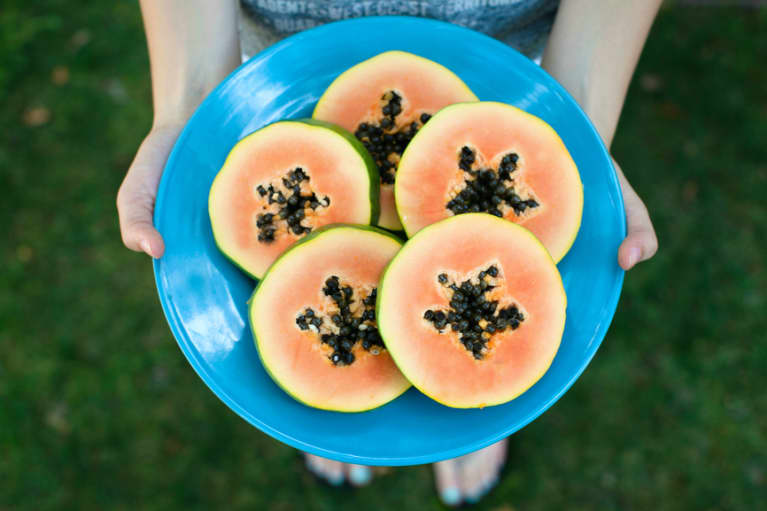The Gut-Protecting Tropical Fruit You Should Eat Before Your Next Night Out ( courtecy;- Jonathan Galland By Jonathan Galland )
The Gut-Protecting Tropical Fruit You Should Eat Before Your Next Night Out
May 7, 2017 — 9:50 AM
The papaya fruit is native to the lush tropical region stretching from southern Mexico to Panama and spread into the wild in the Caribbean, South America, and Africa. The distinctive fragrance of papaya wafts through the greenmarkets here in Havana, Cuba, where I am researching and writing about food. Papaya is an important crop on the island and has benefited from environmentally friendly farming practices such as composting, which enhances soil fertility and moisture—two things papayas love.
Domesticated by the Maya or Incas, scholars believe, papaya was later spread to tropical zones around the world. In a dramatic example of how this occurred, papaya was brought by the Spanish from Acapulco in Mexico across the Pacific Ocean on its lucrative trade route to the Philippines. Spanish galleons going off course may have also brought the papaya to the Hawaiian islands. Now Hawaii has over 300 papaya farms.
In the wild, papaya fruit was small and seedy but through cultivation and selection for larger fruit, papaya has grown. Now, the small variety (also known as Hawaiian papaya) produces fruit up to about 2 pounds while the large variety (or Mexican papaya) produces fruit that tops the scales at 10 pounds! Papayas are grown in 60 countries with Asia, South America, and Africa accounting for the top-producing regions. Mexico is the leading exporter of papaya, while the United States is the largest importer.
Modern research has confirmed the phytonutrients in papaya as antifungal, anti-inflammatory, neuroprotective, antihypertensive, and wound healing. And that's just for starters; here's what the research says about papaya and our health:
1. It's antioxidant.
A study from the University of Salerno in Italy explains that oxidative stress hastens the aging process and leads to many chronic diseases. Foods high in antioxidants play a pivotal role in fighting back against oxidative stress, aging, and disease. The researchers point out that papaya is loaded with the antioxidants beta-carotene (the amazing orange-red hue gives that away), vitamin C, and tocopherols (a vitamin E compound).
2. It's anti-inflammatory.
Papaya has been celebrated in folk medicine for various reasons, including its ability to fight inflammation. A review from the University of Queensland in Australia confirmed the anti-inflammatory and immune-modulating properties of the phytonutrients in papaya.
3. It's antibacterial.
With the rise of the superbugs that resist antibiotics, there's great interest in the research community to find novel antibacterials. Researchers at the University of the West Indies in Jamaica looked at the effects of ripe and unripe papaya on select micro-organisms. Their experiments revealed that papaya inhibits E. coli and other bacteria.
4. It protects the stomach from alcohol damage.
A fascinating experiment out of the University of Malayan suggests that an extract of the papaya leaf, high in antioxidants, helped protect lab rats against stomach damage caused by alcohol. They also note the potential use of papaya for preventing gastric ulcers.
5. It fights parasites.
"Papaya has proven effects against both worms and amoebic parasites," observed researchers from Obafemi Awolowo University, in Nigeria. They tested a preparation of papaya seeds and honey and discovered it was effective in clearing parasites.
To learn more about delicious fruit, vegetables, and herbs that can help reduce inflammation, check out the anti-inflammatory program in my new book, The Allergy Solution.
Important note to reader: If you are allergic to papayas, do not consume papaya or its extracts.


মন্তব্যসমূহ
একটি মন্তব্য পোস্ট করুন